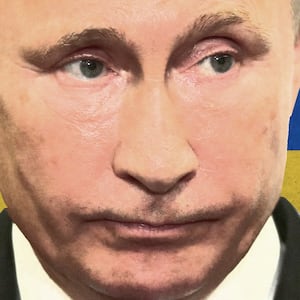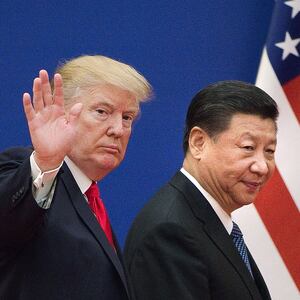I spend more and more time with worried diplomats and other foreign officials. Without exception, they quickly turn the tables on me and ask, what will happen next in the chaos of the Trump administration? Who is going to leave next? What’s the next Russia investigation charge that will drop?
I’m also hearing that from former fierce advocates of Trump who say, essentially, “We voted for him because we sorely needed a disruptor. We got one. But he’s disrupting… a little too well.”
They are resentful about some of the solidly Republican policies they’ve managed to enact that have been overshadowed by Trump’s flair for the dramatic—and they are increasingly worried that the legacy of the administration they are working so hard for may be criminal activity, and not necessarily Trump collusion with Russia, but Trump or his wider family being found out for money laundering and the like.
Both groups look to Trump’s performance at venues like the G20 in Argentina as a chance to reassure allies and supporters like them that Trump’s hard-driving rhetoric and anything-goes, outside-the-box deal-making will make the insults delivered by Trump tweets, and the drama of the Mueller investigation pale next to the successful payoff of a high-stakes game of trade-tariff chicken Trump has been playing with Mexico and Canada, Europe and China.
They got part of their wish: the signing of a new trade deal, the new United States-Mexico-Canada Agreement, that’s been praised by U.S. dairy and agriculture groups. Trump told reporters he’ll formally terminate the North American Free Trade Agreement shortly, an agreement he has called “the worst trade deal ever made." It was signed in 1992 by President George H.W. Bush, whom the country lost this weekend at age 94.
Trump griped that Bush’s death put a “damper” on his meeting with Chinese Premier Xi Jinping, which might otherwise have made a little more news. Trump told reporters he’d reached the broad outlines of a trade deal with China: a 90-day reprieve on the U.S. threat to raise duties on $200 billion worth of Chinese goods from 10 to 20 percent in January, while China had agreed to buy a “very substantial amount of agricultural, energy, industrial” products from the United States.
That still leaves markets unsettled, waiting for details and actual follow-through, and still irked by the possibility of a future trade war between two huge countries that are symbiotically linked, not least, by the amount of money the U.S. owes China.
But Trump skipped a chance to formally meet Russia’s President Vladimir Putin and take him to task for adventurism in seizing Ukrainian naval vessels off the Crimean coast, the kind of meeting that comes with an agenda and staffers present to follow up on whatever is hammered out — and briefings to reporters on what was discussed.
That gave Putin the opportunity to blame the skipped formal sit-down on internal U.S. politics, hinting at the Mueller investigation revelations on the eve of the summit about Trump’s alleged business outreach to Moscow during his presidential campaign. Worse for Trump, the Russian leader revealed they did end up talking informally before the summit dinner, “on their feet,” and he said Trump brought up the subject of Ukraine. No way to know if he was tough about it, but past performance in Helsinki would say otherwise.
"It's a pity that we weren't able to have a real meeting. I think that one is really necessary. I hope that we can meet when the U.S. side is ready for it," he said, according to AFP, and making reference to Trump’s announced intention to withdraw from the 1987 Intermediate-Range Nuclear Forces (INF) Treaty.
"The questions that we have to discuss are very important. They are above all questions about strategic stability, questions about non-proliferation of weapons of mass destruction,” Putin said, playing the long-suffering-and-reasonable leader who is being patient with the scandal problem plaguing his American counterpart.
Unchallenged by a U.S. leader publicly holding him to account, Putin portrayed himself and his country as statesman-like, describing how he is working with other Mideast countries to quell the violence in Syria, and deploying whataboutism on the Ukraine boat seizure, accusing Ukraine of using war to deflect attention from its own economic failures.
There was no American president publicly pushing back at the summit, taking the lead as Ukraine had hoped, to call for the release of the jailed Ukrainian sailors, or outline other steps like telling Moscow to honor its 2003 agreement to share the Sea of Azov and allow Ukrainian ships unfettered passage to the adjacent Black Sea through the Kerch Strait.
Trump also skipped the chance to deliver a stern message on human rights to Saudi Crown Prince Mohammed bin Salman over the killing of Washington Post journalist Jamal Khashoggi, as French President Emmanuel Macron did in a quick but brutal aside caught on camera.
“Don’t worry,” MBS says. “I am worried,” Macron replies, adding, “You never listen to me.”
Trump risked no such public shaming of the Saudi king-to-be, having absolved him of guilt in a declaration of support that came out even before the kingdom has finished its investigation, given a full accounting of the Khashoggi murder and punished those found guilty.
That’s not really the point of the G20, a gathering of nations that weigh in at 85 percent of the world’s economic output and two-thirds of its population. It was convened to prevent another economic conflagration after the credit crisis meltdown that hit the globe in 2007.
But it was convened in Washington, D.C., in 2008 by the George W. Bush administration because in a time of crisis most of the world still looked to America to find solutions.
The Trump administration did release a list of what it called examples of leadership, including sanctioning Venezuela, Cuba and Nicaragua over corruption and attacks on democratic institutions, and it celebrated adding language to the final communique that the World Trade Organization is in need of reform. It also blocked other nations’ attempts to add any denigration of protectionism to the document.
But most diplomats I speak to say Trump’s America First focus comes off as “American throwing its weight around,” mostly with its friends, and soft-shoeing criticism of its enemies, and this summit was no exception. It was the United States that held up agreement on almost every section of the final communique, according to the AP and other news outlets.
That’s why meetings like the G20 are becoming opportunities for friends, frenemies and adversaries of America to create new connections meant to circumvent or survive without Washington.
Putin announced that he was renewing Moscow’s deal with Saudi Arabia to cut oil production, to combat a looming supply glut that could produce lower oil prices.
France and China jointly announced their commitment to implement the Paris Climate Agreement—the one Trump pulled out of—and the final G20 statement upheld the accord, sans the United States. Now parties to the climate change convention that the U.S. has spurned are kicking off a two-week U.N. meeting in Poland. They're trying to meet an end-of-year deadline to come up with rules to try to keep global temperatures from rising by up to 2.7 degrees Fahrenheit.
Meanwhile, Iran underscored Trump’s go-it-alone performance at the G20 with a move of defiance Saturday, launching a medium-range ballistic missile. No doubt Tehran was motivated by the Trump administration’s announced hope just prior to the G20 that it would use the summit to unify an international coalition to totally cut off Tehran from the outside world economy.
There were no major, meme-creating gaffes by Trump so the wider public—Trump supporters and haters alike—are unlikely to take much notice of this event.
But America’s allies will remain worried. That tension will keep fueling the outreach by America’s allies to each other, building connections for a possible time when Trump is too hobbled by the Mueller investigation or too inward-looking to come to their aid.
As one high-ranked diplomat put it to me, in a phrase that captures the sentiments of many I've spoken to: the Trump administration is like a rickety plane in flight. It’s working, but you don’t know how long it will stay up, or if it will deliver its passengers safely. So America’s allies are looking for parachutes.











